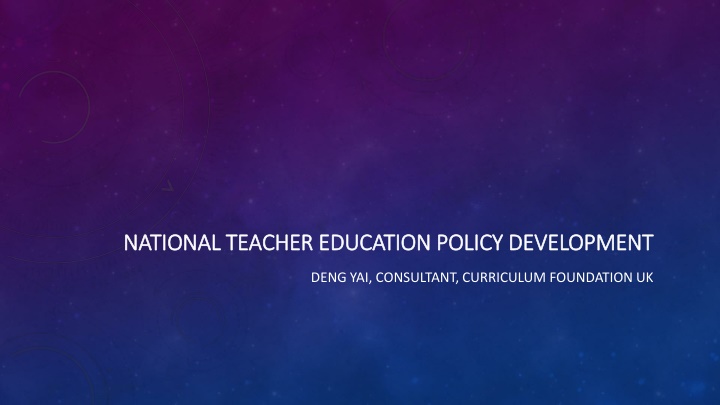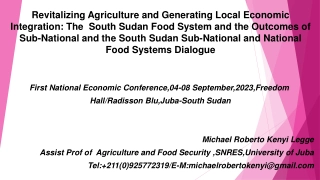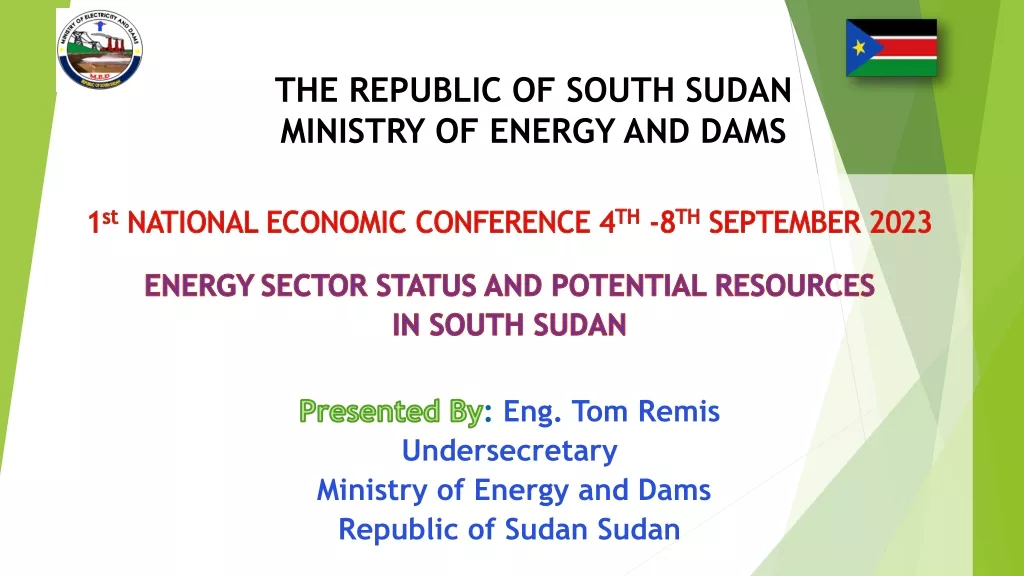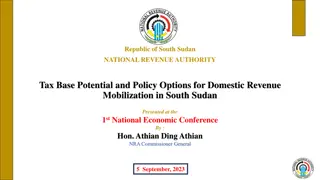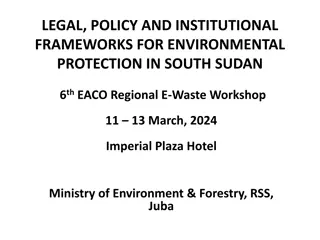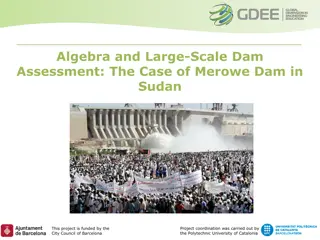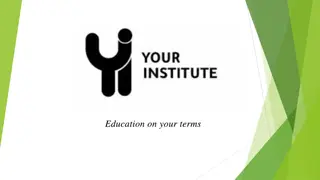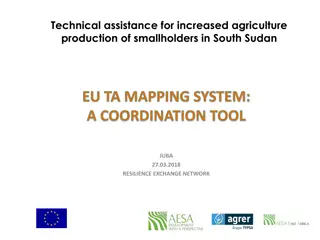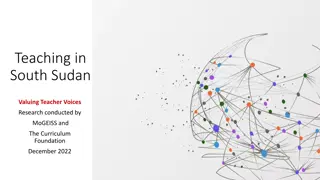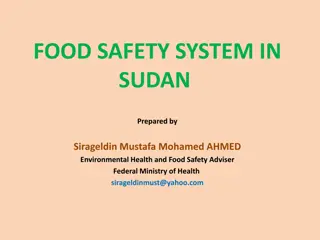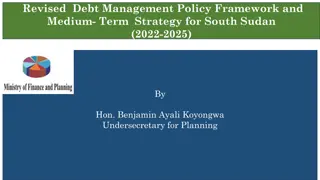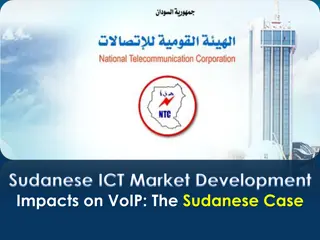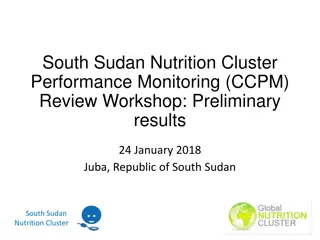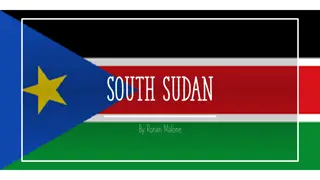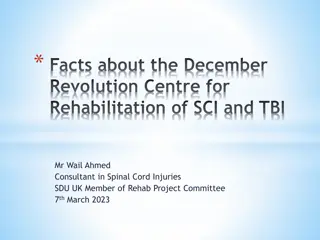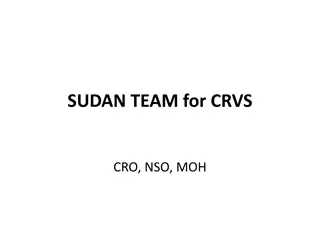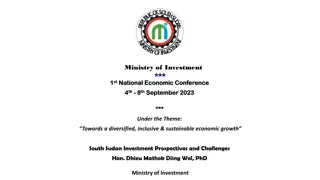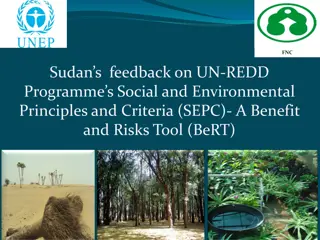Education Policy and Development in South Sudan
South Sudan's education landscape is shaped by policies like the National Teacher Education Policy, Transitional Constitution, Right to Education, General Education Act, and Strategic Goals for building a prosperous, informed, and tolerant nation by 2040. The focus is on providing equal access to education, training teachers, and developing a skilled workforce in line with national professional standards.
Download Presentation

Please find below an Image/Link to download the presentation.
The content on the website is provided AS IS for your information and personal use only. It may not be sold, licensed, or shared on other websites without obtaining consent from the author.If you encounter any issues during the download, it is possible that the publisher has removed the file from their server.
You are allowed to download the files provided on this website for personal or commercial use, subject to the condition that they are used lawfully. All files are the property of their respective owners.
The content on the website is provided AS IS for your information and personal use only. It may not be sold, licensed, or shared on other websites without obtaining consent from the author.
E N D
Presentation Transcript
NATIONAL TEACHER EDUCATION POLICY NATIONAL TEACHER EDUCATION POLICY DEVELOPMENT DEVELOPMENT DENG YAI, CONSULTANT, CURRICULUM FOUNDATION UK
TRANSITIONAL TRANSITIONAL CONSTITUTION CONSTITUTION, 2011 , 2011 WHAT DOES THE CONSTITUTION SAY ABOUT EDUCATION?
RIGHT TO EDUCATION 29 (1) Education is a right for every citizen and all levels of government shall provide access to education without discrimination as to religion, race, ethnicity, health status including HIV/AIDS, gender or disability. (2) All levels of government shall promote education at all levels and shall ensure free and compulsory education at the primary level; they shall also provide free illiteracy eradication programmes.
GENERAL EDUCATION ACT, 2012 WHAT DOES THE ACT SAY ABOUT TEACHER EDUCATION?
TRAINING AND DEVELOPMENT OF TEACHERS 25. Training and Development of Teachers. (A) The Ministry of Education shall develop a policy of teachers training and development to cover both pre- and in-service teachers training to be implemented by all the State Ministries of Education and other institutions throughout the country. (B) The Ministry shall ensure that the policy of teachers training and development is implemented consistently throughout the country. (C) The Ministry shall also develop national professional standards for teachers to be used as the basis for teachers training and development programs in the Republic of South Sudan. (D) The Ministry shall develop teachers training and development programmes based on the national professional standards for teachers.
SOUTH SUDAN VISION 2040: SOUTH SUDAN VISION 2040: TOWARDS FREEDOM, EQUALITY, JUSTICE, PEACE AND PROSPERITY FOR ALL
STRATEGIC GOALS STRATEGIC GOALS Strategic Goal (1): To build an educated and informed nation. Strategic Goal (2): To build a prosperous, productive and innovative nation. Strategic Goal (3): To build a compassionate and tolerant nation. Strategic Goal (4): To build a free, just and peaceful nation. Strategic Goal (5): To build a democratic and accountable nation. Strategic Goal (6): To build a safe, secure and healthy nation. Strategic Goal (7): To build a united and proud nation.
TRANSFORMING OUR WORLD: AGENDA 2030 FOR SUSTAINABLE DEVELOPMENT, 2015
Goal 3. Ensure healthy lives and promote well-being for all at all ages SUSTAINABLE DEVELOPMENT GOALS Goal 4. Ensure inclusive and equitable quality education and promote lifelong learning opportunities for all Goal 5. Achieve gender equality and empower all women and girls Goal 6. Ensure availability and sustainable management of water and sanitation for all Goal 7. Ensure access to affordable, reliable, sustainable and modern energy for all Goal 8. Promote sustained, inclusive and sustainable economic growth, full and productive employment and decent work for all Goal 9. Build resilient infrastructure, promote inclusive and sustainable industrialization and foster innovation Goal 10. Reduce inequality within and among countries Goal 11. Make cities and human settlements inclusive, safe, resilient and sustainable Goal 12. Ensure sustainable consumption and production patterns Goal 13. Take urgent action to combat climate change and its impacts *Goal 14. Conserve and sustainably use the oceans, seas and marine resources for sustainable development Goal 15. Protect, restore and promote sustainable use of terrestrial ecosystems, sustainably manage forests, combat desertification, and halt and reverse land degradation and halt biodiversity loss Goal 16. Promote peaceful and inclusive societies for sustainable development, provide access to justice for all and build effective, accountable and inclusive institutions at all levels Goal 17. Strengthen the means of implementation and revitalize the global partnership for sustainable development* Acknowledging that the United Nations Framework Convention on Climate Change is the primary international, intergovernmental forum for negotiating the global response to climate change.
NATIONAL CURRICULUM WHAT ARE THE AIMS OF THE CURRICULUM?
KEY AIMS OF THE CURRICULUM The National Curriculum aims to develop - 1. Good citizens of South Sudan 2. Successful lifelong learners 3. Creative and productive individuals 4. Environmentally responsible members of society
NATIONAL GENERAL EDUCATION POLICY, 2017-2027 What reforms have been prioritised by the Policy?
IN-SERVICE TEACHER TRAINING The Ministry will implement the following policy reforms: In-Service Teacher Training shall be an entitlement of all serving teachers throughout the Republic of South Sudan. The National Ministry of General Education will develop a policy on professional development of teachers to cover both pre-service teacher training and in-service teacher training to be implemented by all the State Ministries of Education and other institutions throughout the country. The National Ministry will ensure that the policy on professional development of teachers is implemented consistently throughout the country. The Ministry will also ensure The National Professional Standards for Teachers, 2012, are used as the basis for all teacher training and development programmes in the Republic of South Sudan.
IN-SERVICE TEACHER TRAINING The Ministry will implement the following policy reforms: The Ministry will develop teacher training and development programmes based on the national professional standards for teachers and ensure such programmes are implemented throughout the country. The Ministry will also provided appropriate learning resources including digital learning resources to ensure that teacher have easy and flexible access to rich learning resources at their leisure. Develop highly professional, competent, committed, efficient and motivated teaching cadres or workforce. Establish and maintain a Teacher Management Information System (TMIS) and credible payroll system. Develop the In-service teacher training programme: 2-year for secondary school leavers and the mode of training will be distance learning, e-learning, school-based mentoring and coaching and face to face lectures delivered at the CECs for teachers in the school; Short school-based, in-service teacher training programmes; and Continuous professional development for all teachers.
IN-SERVICE TEACHER TRAINING Develop policy on teachers accreditation and certification system to link the institutions to national public universities, in the interim, and establish an independent system operated by the National Examinations Council in the long run. Harmonise the teaching practice period for all teacher training institutions of the same level. Make ICT a priority area for Continuous Professional Development (CPD) for all teachers. Establish a 3-year diploma programme for secondary school teachers in NTTIs. Expand access to include education training through decentralised training centres at CECs. Concepts and best practices of inclusive education and other cross-cutting issues will be an integral component of the teacher training programmes. These reforms will ensure all teachers access in-service teacher training and Continuous Professional Development (CDP) opportunities to increase teacher capacity; to enhance teacher professionalism; and to improve performance of teachers. They will impact positively on the quality of teaching and learning in all schools throughout the Republic of South Sudan.
IN-SERVICE TEACHER TRAINING The Ministry will implement the following policy reforms: The Ministry will develop teacher training and development programmes based on the national professional standards for teachers and ensure such programmes are implemented throughout the country. The Ministry will also provided appropriate learning resources including digital learning resources to ensure that teacher have easy and flexible access to rich learning resources at their leisure. Develop highly professional, competent, committed, efficient and motivated teaching cadres or workforce. Establish and maintain a Teacher Management Information System (TMIS) and credible payroll system.
PRE-SERVICE TEACHER TRAINING The government will implement the following policy reforms: The Ministry will issue regulations to govern the operation of teachers training institutions and assure the quality of teachers training programmes though out the Republic of South Sudan. The Ministry will develop and implement a national inspection framework for inspection of all institutions providing teacher training in the Republic of South Sudan. The Ministry will provide resources and manage all the current government-owned National Teacher Training Institutes, and may establish additional ones to meet the demand for pre-service teacher training in the country. The Ministry will build the capacity of the government-owned National Teacher Training Institutes to support the Ministry to fulfil its quality assurance responsibility for teacher training programmes throughout the country. The Ministry will develop a system of registration and accreditation of teacher training institutions and inspect their teacher training programmes. These policy reforms will ensure more South Sudanese citizens are trained to become teachers and, in so doing, ensure constant supply of teachers to replenish the workforce.
SCHOLARSHIPS FOR TEACHERS The Government will implement the following reforms: The National Ministry will establish a scholarships programme for teachers or employees to be known as the South Sudan Government and States Scholarships Programme. The scholarships will be attainable at all the universities in South Sudan and any other universities, colleges or institutions elsewhere approved by the Ministry. Any teacher or employee who is awarded a scholarship under this Policy will sign a bonding agreement with the National Ministry or State Ministries of Education to ensure he or she returns to upon his or her qualification to continue to serve within the education system at the Ministry or State Ministries for a period equivalent to the period for which the scholarship was awarded; or else, he/she will be required to reimburse the cost of the scholarship in case he or/she shifts to serve elsewhere. These reforms will ensure that teachers get scholarships and engage in continuous professional development to increase their professionalism.
NATIONAL COMMITMENTS The Republic of South Sudan will - Screen the workforce to ensure all Teachers meet the minimum standards for recruitment of Teachers in accordance with the General Education Act, 2012, Section 21, ensure that the are registered and licensed in accordance with the Act, 2012. Recruit additional 60,000 qualified teachers to meet the shortage of Teachers throughout the country (MOGEI, 2017). Implement the provisions of the National General Education Policy, 2017-2027, related to affirmative action and increase the percentage of female teachers in the workforce from 17% to 50 % by 2030 and in so doing, exceed the minimum threshold of 35% representation of women in all government institutions. Implement the provisions of the General Education Act, 2012, and the resolutions of the General Education Annual Review (GEAR) Conference, 2020 (MoGEI, 2020), related to pay and additional allowances for teachers to increase teacher pay, improve teacher morale and motivation, and improve the conditions of service for teachers to ensure the teaching profession is attractive and can attract the best. Implement the National General Education Policy, 2017-2027, the National Teacher Education Policy, 2022-2030, and the National Teacher Education Strategy, 2022-2027, and provide pre-service (initial teacher training) and in-service training or continuous professional development (CPD) for Teachers throughout the country to increase the number of qualified teachers in schools, increase teacher professionalism and improve the quality of teaching and learning, and enhance the quality of learning outcomes for all learners.
NATIONAL COMMITMENTS The Republic of South Sudan will - Train School Inspectors and Supervisors to effectively inspect and supervise schools, provide feedback and promote the culture of innovation, continuous school improvement and excellence. Implement the policy reforms related to management, school leadership and governance, ensure that all Headteachers, Deputy Headteachers and School Governors are trained and qualified to lead and govern our schools, are able to provide quality leadership, support teachers and increase teacher professionalism as well as promote the culture of innovation, continuous school improvement and excellence in all schools (MOGEI, 2017). Establish and resource more County Training Centres and other teacher training institutions in the country and use them for the purpose of teacher training. Amend the General Education Act, 2012, to raise the minimum qualification for recruitment of Teachers in the Republic of South Sudan to a Bachelor s Degree in Education or a Bachelor s Degree in any other discipline and a teaching qualification from a recognised institution. Ensure that Teachers in ECD, Primary and Secondary schools throughout the country are university graduates as from 2025.
NATIONAL COMMITMENTS The Republic of South Sudan will - Encourage Teachers to play a more active role in educational research, participate in debates related to transformation of education in the country. Provide scholarships and twining opportunities for Higher Education staff, Technicians and Administrators and create opportunities for study visits for HE teaching staff. Encourage twining arrangements between Higher Education Institutions in South Sudan with their counterparts in the region and the world at large. Review the salary structure for staff of HEIs and continue to improve their pay and conditions to improve retention. Promote research to support achievement of the SDGs and other development objectives in the country. We believe these transformative actions will enable our teachers, School Inspectors, Headteachers and School Governors to play their roles more effectively to substantially improve the quality education throughout the Republic of South Sudan.
ANNUAL EDUCATION CENSUS 2021 WHAT IS THE CURRENT SITUATION OF TEACHERS IN SOUTH SUDAN?
THE SIZE OF THE TEACHING WORKFORCE Table 3.10: Number and percentage of teachers by gender and school type Type of school Total Male Female %Male %Female AES 3,247 2,818 429 86.8% 13.2% PPR 4,038 1,474 2,564 36.5% 63.5% PRI 46,782 39,561 7,221 84.6% 15.4% SEC 6,644 6,127 517 92.2% 7.8% Total 60,711 49,980 10,731 82.3% 17.7%
QUALIFICATIONS OF PRIMARY SCHOOL TEACHERS Table 5.60: Number of Primary Teachers with the specified teaching qualification obtained State None Certificate Diploma Degree Total Abyei AA 63 355 13 7 438 Central Equatoria 2,674 2,115 477 295 5,561 Eastern Equatoria 896 1,727 149 48 2,820 Jonglei 1,218 1,233 63 15 2,529 Lakes 2,782 2,403 38 22 5,245 Northern Bahr el Ghazal 5,217 3,143 71 12 8,443 Pibor AA 278 396 35 10 719 Ruweng AA 335 318 15 6 674 Unity 1,143 717 12 17 1,889 Upper Nile 423 956 169 69 1,617 Warrap 5,816 3,700 127 141 9,784 Western Bahr el Ghazal 1,896 1,412 166 84 3,558 Western Equatoria 1,952 1,469 67 17 3,505 Total 24,693 19,944 1,402 743 46,782
QUALIFICATIONS OF SECONDARY SCHOOL TEACHERS Table 6.56: Secondary Teachers with the specified teaching qualification obtained in 2021 State None Certificate Diploma Degree Total Abyei AA - - 1 27 28 Central Equatoria 439 339 227 837 1,842 Eastern Equatoria - 267 156 199 622 Jonglei 124 75 25 28 252 Lakes 125 255 30 59 469 Northern Bahr el Ghazal 444 205 29 56 734 Pibor AA 4 9 3 - 16 Ruweng AA 22 71 21 26 140 Unity 128 34 7 18 187 Upper Nile 50 23 35 114 222 Warrap 366 253 62 270 951 Western Bahr el Ghazal 445 47 62 201 755 Western Equatoria 139 104 126 57 426 Total 2,286 1,682 784 1,892 6,644
NATIONAL PROFESSIONAL STANDARDS FOR TEACHERS IN SOUTH SUDAN WHAT DO YOU NEED TO ACHIEVE TO QUALIFY AS A TEACHER?
NATIONAL NATIONAL PROFESSIONAL PROFESSIONAL STANDARDS STANDARDSFOR FOR TEACHERS TEACHERS IN SOUTH SUDAN IN SOUTH SUDAN Teaching and Learning STRAND 1 Knowledge of the learners and how they learn Strand 2 Knowledge of the subject being taught Strand 3 Teaching methods Strand 4 Assessment and evaluation methods Strand 5 Learning environment Teaching as a Profession Strand 6 Professional responsibility and growth Strand 7 Teachers code of conduct and professional ethics
